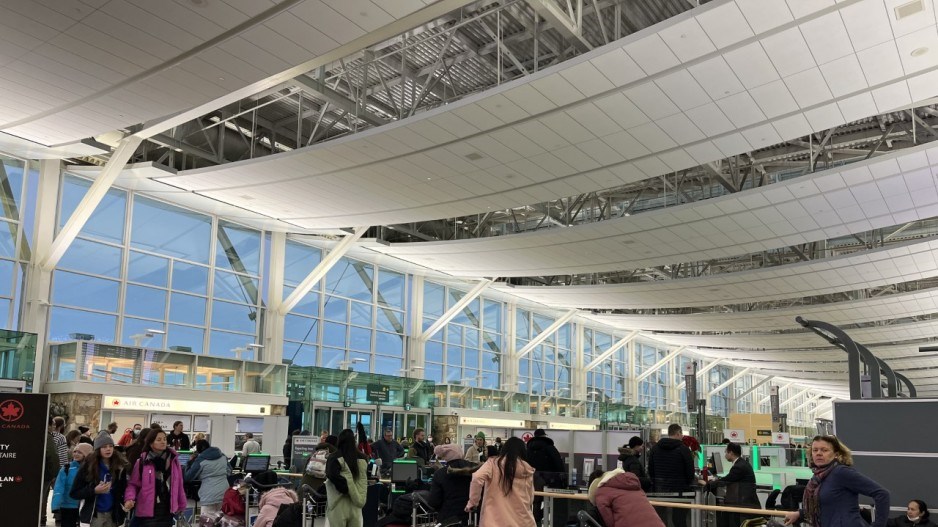Vancouver International Airport (YVR)'s mass delays and cancellations this week were "unacceptable," but everything appeared on track Friday, according to its CEO, who was "pleased" with the airport's performance.
YVR CEO Tamara Vrooman acknowledged that the long waits, some up to around 10 hours, for passengers inside planes on the tarmac on Tuesday were "unacceptable" and apologized to those affected.
"It's one thing to get delayed in an aircraft, it's another after a 16-hour flight from Manila or something like that to have to wait extra time," she said.
Vrooman said YVR has since changed its policies to prioritize gate access according to the duration to get people off planes, rather than the usual "first in, first out" practice.
"As a result, we had no holds (at gates) on Wednesday, Thursday and we've had none today."
Vrooman told The Richmond News that the airport knew the snow was coming on Tuesday and was prepared, but the heavy and concentrated snowfall meant planes had to keep circling back to get deiced, much like shovelling the sidewalk when it's snowing.
"When you deice an aircraft, you take the snow off the wings. But if the snow is coming down really, really heavily then by the time you've deiced an aircraft, and it makes its way to the runway, the snow has already re-accumulated," Vrooman explained.
Since planes are not allowed to take off with snow accumulation, this became a cycle, which then led to delays and cancellations as congestion built on the airfield.
Vrooman's leadership was questioned earlier as she appeared to have been silent during the chaos on Tuesday, and she later told Global News that she was on the ground helping customers.
When asked if it was the most effective use of her time, Vrooman told The Richmond News that it was important "to hear directly from the people that (YVR is) serving to make sure that (YVR is) in touch in real-time with their experiences."
The main takeaway, said Vrooman, is "the more information (YVR) can provide to passengers, the better."
She also clarified that she had "a variety of roles" to play in such situations, and she had spent time "making the operational and strategic decisions" such as adjusting policies to prevent people from being stuck at gates.
"When weather hits, it causes delays. And I totally understand, particularly at this time of the year, how people can be frustrated and disappointed with those cancellations," she said.
"However, the work that the airport did to prepare with snow removal and deicing worked as it should in these conditions, and I'm really pleased with the performance of our team."
Keeping the workers safe
First-hand accounts of what it was like to work during Tuesday's debacle were also seen on social media, such as TikTok user Dj Sugue's video which showed workers walking through thick layers of snow and water leaking in different parts of the airport.
When asked about the safety of airport workers, Vrooman said it's the airport's "primary concern" and extra safety officers and procedures have been implemented. So far, no "major safety events" have occured.
Vrooman added that she was "very, very impressed" with the 26,000 people working this week.
"It's a true team sport, and they've gone above and beyond in very, very challenging situations, particularly those who work outside."
So far so good, despite the storm
According to Vrooman, YVR is currently operating at about 50 per cent of its normal capacity at this time of the year. She added that cancellations by WestJet and Air Canada, which were communicated to passengers in advance, meant that only those with scheduled flights have gone to the airport, which helps YVR process the traffic.
"So far, the really extreme freezing ice and freezing rain conditions have not materialized," said Vrooman.
"We're starting to see some rain precipitation here, but so far, we're operating as planned."
And for those affected, YVR is providing access to more than 400 hotel rooms and meal vouchers from today through Dec. 27, according to a media release.
A designated area with cots, blankets, hygiene kits and other supplies has also been set up in Level 3 departures, past U.S. check-in, and staff and volunteers will continue to assist passengers. As of now, more than 10,000 snacks, 15,000 water bottles and 1,500 blankets have been handed out.
Passengers are advised to plan ahead and anticipate potential flight impacts.




